« Tackling City Challenges: IBM Unveils New 'Serious Game' | Main | International Space Station Expedition 23 Crew Lands Safely »
May 31, 2010
Everybody's Business: Strengthening International Cooperation in a More Interdependent World
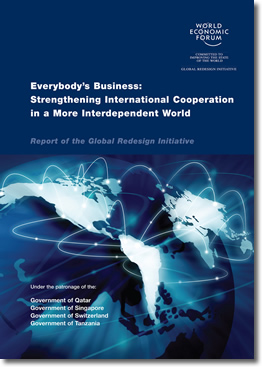
The World Economic Forum today issued one of the most extensive sets of proposals to strengthen international cooperation and governance ever assembled.
• The product of a year-long dialogue and group of task forces involving over 1,500 academic, business, governmental and civil society experts and decision-makers from around the world, the Forum's Global Redesign Initiative report contains 58 specific proposals and nine thematic essays by some of the international community's leading authorities on international economic, environmental and security cooperation.
Entitled Everybody's Business: Strengthening International Cooperation in a More Interdependent World, the Forum's report warns that global severe risks and challenges are accumulating in many areas, and international institutions and arrangements are often ill-equipped to provide a proactive response.
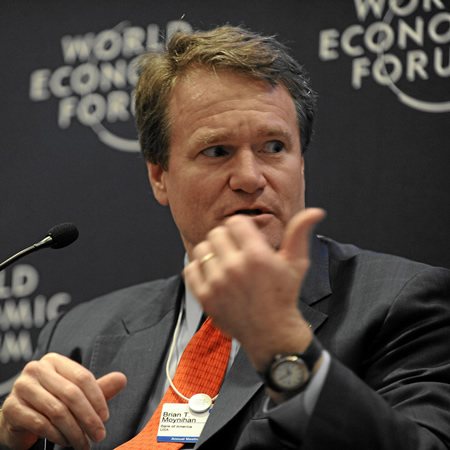
Photo: Brian T. Moynihan, President, and Chief Executive Officer, Bank of America, USA, captured during the session 'Redesigning Capital Markets' at the Congress Centre of the Annual Meeting 2010 of the World Economic Forum in Davos, Switzerland, January 29, 2010. (© World Economic Forum. Photo by Michael Wuertenberg).
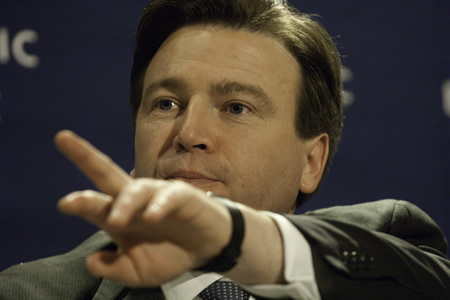
Photo: Geoff Cutmore (Anchor, CNBC, United Kingdom) captured at the World Economic Forum on Europe held in Brussels, Belgium, May 10, 2010. (© World Economic Forum. Photo by Youssef Meftah).
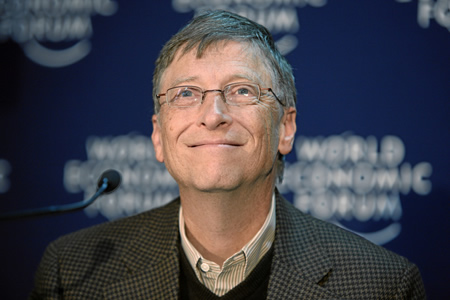
Photo: William H. Gates III, Co-Chair, Bill & Melinda Gates Foundation, USA, smiles during the 'Bill & Melinda Gates Foundation Pledge' in the Congress Centre of the Annual Meeting 2010 of the World Economic Forum in Davos, Switzerland, January 29, 2010. (© World Economic Forum. Photo by Sebastian Derungs).
The report reminds the international community that amid the financial crisis in late 2008 and early 2009, it "was seized with the transformational nature of our times." The report calls on it to "hold on to that moment of possibility, consolidate its considerable accomplishment in containing the crisis and renew its earlier commitment to renovate the international system."
Drawing a parallel to the 1944 Dumbarton Oaks and Bretton Woods conferences that designed much of the post-war international security and economic architecture over a year before World War II ended, the report concludes that the time has come for governments, companies, and other civil society institutions to "rise above their immediate, parochial interests and consider more seriously their long-term stake in a properly structured and resourced global cooperation system for the 21st century."
Forum Managing Director Richard Samans, Executive Chairman and Founder Klaus Schwab and Vice-Chairman Lord Malloch-Brown conclude: "Even as governments develop their exit strategies from fiscal and monetary stimulus measures applied during the crisis, they should engage to absorb the larger meaning of the changes that have transformed the international community."
The Forum report proposes a "blueprint for renovating international cooperation in an era of increasingly complex interdependence, rendering it both more effective and legitimate" based on the many proposals that have emerged from the Global Redesign process.
In particular, it proposes a more results-oriented "multidimensional" approach to international governance and cooperation. The report argues that the international community's increasing interdependence creates new modes and means of accelerating progress on many global challenges. It demonstrates how pragmatic strategies can be combined to achieve breakthroughs on such issues as climate change, fisheries depletion, unemployment and poverty, public health, the proliferation of weapons of mass destruction and educational access, and illiteracy.
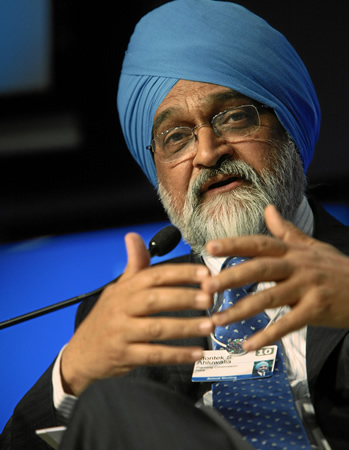
Photo: Montek S. Ahluwalia, Deputy Chairman, Planning Commission, India, speaks during the session 'Rethinking Government Assistance' in the Congress Centre of the Annual Meeting 2010 of the World Economic Forum in Davos, Switzerland, January 29, 2010. (© World Economic Forum. Photo by Remy Steinegger).
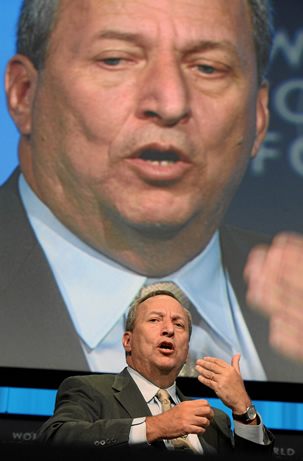
Photo: Lawrence H. Summers, Director, National Economic Council (NEC), Executive Office of the President, USA, is captured during the session 'The US Economic Outlook' at the Annual Meeting 2010 of the World Economic Forum in Davos, Switzerland, January 29, 2010. © World Economic Forum. Photo by Monika Flueckiger).
The report calls for the "state-based core of the international system to be adapted to our more complex, bottom-up world in which non-governmental actors have become a more significant force." To this end, it urges governments and international organizations to conceive of themselves more explicitly as constituting part of "a much wider global cooperation system that has the potential to overcome the limitations of scale, information, and coherence."
The report calls for a stronger sense of ownership and responsibility on the part of the non-governmental institutions and their leaders regarding the underlying health of the international system.
• The report criticizes the "severe price the international community has paid for its complacency about systemic financial and macro-economic risks that were well-publicized but allowed to accumulate for too long." It calls on "those who educate and select business, scientific, academic, religious, media as well as political leaders to redesign their curricula and senior talent development and promotion policies to reflect that they are cultivating not only leaders of functional organizations but also stewards of the international system."
In addition to making proposals to strengthen international cooperative structures on problems as diverse as financial stability, international trade, water scarcity, prevention of mass atrocities, Internet security, malnutrition, energy security and many others, the report of the Global Redesign Initiative includes a number of broader proposals for the international community. For example, it:
• Urges the Group of 20 Leaders' process to clarify soon its ongoing purpose and relationship with the United Nations and specialized international organizations. In addition, it challenges these leaders to reach a package deal on the currently deadlocked UN climate, WTO trade, Millennium Development Goal funding, IMF and World Bank reform, and global macro-economic rebalancing negotiations, arguing that this kind of systemic leap forward in international cooperation would yield large net benefits for developing, emerging and advanced countries alike and could only be brokered by G20 leaders.
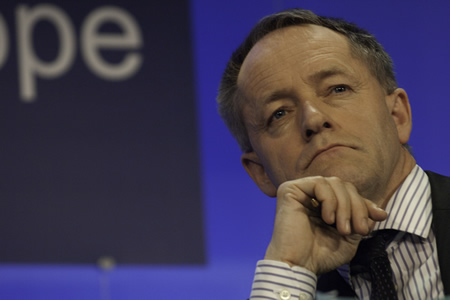
Photo: Peter Westaway (Chief European Economist, Nomura International Plc, United Kingdom) captured at the World Economic Forum on Europe held in Brussels, Belgium, May 10, 2010. (© World Economic Forum. Photo by Youssef Meftah).
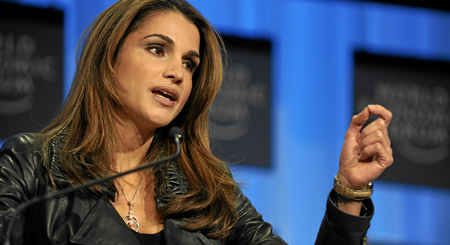
Photo: H.M. Queen Rania Al Abdullah of the Hashemite Kingdom of Jordan; Member of the Foundation Board of the World Economic Forum; Global Agenda Council on Education Systems captured during the session 'Rebuilding Education for the 21st Century' at the congress centre at the Annual Meeting 2010 of the World Economic Forum in Davos, Switzerland, January 30, 2010. (© World Economic Forum. Photo by Michael Wuertenberg).
The proposals were developed by the Forum's Global Agenda Councils of leading experts and decision-makers from academia, business, civil society, international organizations and government as well as its Industry Partner communities and Young Global Leader Task Forces.
The proposals were reviewed by the following distinguished rapporteurs, who have written nine thematic summary chapters that set them in broader context and provide additional proposals:
1. Creating a Values Framework - John J. DeGioia, President, Georgetown University, USA.
2. Building Sustained Economic Growth - Robert Z. Lawrence, Albert L. Williams Professor of Trade and Investment, John F. Kennedy School of Government, Harvard University, USA.
3. Strengthening the International Monetary and Financial System - David Daokui Li, Director and Mansfield Freeman Professor of Economics, Center for China in the World Economy (CCWE), Tsinghua University, People's Republic of China; and Suzanne Nora Johnson, Trustee, Carnegie Institution for Science, USA.
4. Creating Employment, Eradicating Poverty and Improving Social Welfare - John McArthur, Chief Executive Officer, Millennium Promise, USA; and Dennis J. Snower, President, Kiel Institute for the World Economy, Germany.
5. Managing and Mitigating Global Risks - Ian Goldin, Director, James Martin 21st Century School, and Professorial Fellow, Balliol College, University of Oxford, United Kingdom.
6. Ensuring Health for All - Peter Piot, Professor and Director, Institute of Global Health, Imperial College London, United Kingdom; David E. Bloom, Clarence James Gamble Professor of Economics and Demography, Harvard School of Public Health, USA; and Peter C. Smith, Professor, Health Policy, Imperial College London, United Kingdom.
7. Enhancing Global Security - Lilia Shevtsova, Senior Associate, Carnegie Endowment for International Peace, Carnegie Moscow Center, Russian Federation; and Jean-Marie Guéhenno, Senior Non-resident Fellow, Brookings Institution, USA.
8. Ensuring Sustainability - Ashok Khosla, Chairman, Development Alternatives, India; and Caio Koch-Weser, Vice-Chairman, Deutsche Bank Group, Deutsche Bank, United Kingdom.
9. Building Effective Institutions in an Empowered Society - Ngaire Woods, Professor of International Political Economy, University of Oxford, United Kingdom; and Kishore Mahbubani, Dean, Lee Kuan Yew School of Public Policy, Singapore.
"If we do not want to get caught in a continuous vicious cycle of crisis-fighting, we have to analyze the fundamental forces changing our world and formulate policies which take into account the manifold structural changes in geopolitics and geo-economics," said Professor Klaus Schwab, Founder and Executive Chairman of the World Economic Forum.
• Global Redesign Initiative Report: GET IT HERE
Source: World Economic Forum
|GlobalGiants.Com|







Edited & Posted by the Editor | 4:35 AM | Link to this Post







